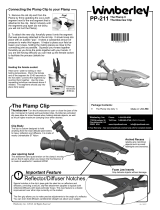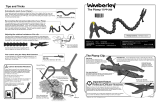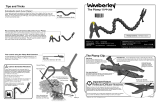Page is loading ...

I
i
A
ELDORADO

/r”‘
--.\
The
1996
Cadillac Eldorado
Owner’s
Manual
Seats and Kestraint Systems
.............................................................
1-1
FeaturesandControls
..................................................................
2-1
Comfort Controls and Audio Systems
.....................................................
3-1
This section tells you how to use your seats and safety belts properly. It also explains the “SIR” system.
This
section explains how to start and operate your Cadillac.
This section tells you how to adjust the ventilation and comfort controls and how to operate your
audio system.
Here you’ll find helpful information and tips about the road and how to drive under different conditions.
This section tells you what to do if you have a problem while driving, such as a flat tire or overheated
engine, etc.
Here the manual tells you how to keep your Cadillac running properly and looking good.
This section tells you how to contact Cadillac for assistance and
how
to get service and owner publications.
It also gives you information on “Reporting Safety Defects” on page
7-10.
Here’s an alphabetical listing of almost every subject in this manual. You can use it to quickly find
something you want to read.
YourDrivingandtheRoad
..............................................................
4-1
ProblemsontheRoad
..................................................................
5-1
Service and Appearance Care..
..........................................................
6-1
Customer Assistance Information
........................................................
7-1
Index
................................................................................
8-1
i

GENERAL MOTORS, GM and the GM Emblem,
CADILLAC, the CADILLAC Emblem and the name
ELDORADO are registered trademarks of General
Motors Corporation.
This manual includes the latest information at the time
it
was printed. We reserve the right to make changes in the
product after that time without further notice. For
vehicles first sold in Canada, substitute the name
“General Motors of Canada Limited” for Cadillac Motor
Car Division whenever
it appears in this manual.
Please keep this manual in your Cadillac,
so
it
will be
there if you ever need it when you’re
on
the road.
If
you
sell the vehicle, please leave this manual
in
it
so
the new
owner can use it.
Litho
in
U.S.A.
Part
No.
25637207
B
0
First Edition
(--)
We
support
voluntary
technician certification.
WE
SUPPORT
VOLUNTARY TECHNICIAN
CERTIFICATION
THROUGH
Natlonal
Institute
for
AUTOMOTIVE
SERVICE
EXCELLENCE
For
Canadian
Qwners
Who
Prefer
a
French
Language
Manual:
Aux
proprietaires canadiens:
Vous
pouvez vous
procurer
un
exemplaire de ce guide en frangais chez
votre concessionaire
ou
au:
DGN Marketing Services Ltd,
1500
Bonhill Rd.
Mississauga, Ontario
LST
1C7
“Copyright General Motors Corporation 1995
All Rights Reserved

The
PENALTY
OF
LEADERSHIP
iii

Henry
M.
Leland,
founder of
Cadillac, stands
beside tfie
1905
“Osceola” which
was built to.
evaluate the
feasibility of a
closed bodied car.
iv

Few automobiles are fortunate enough to have the rich heritage
that is Cadillac. The name Cadillac is appropriately that of
Antoine de La Mothe Cadillac, the French military commander
who founded the city of Detroit in
1701.
What better name for
the oldest automobile manufacturer in Detroit.
Henry
M.
Leland, known as the master of precision,
initiated his precision manufacturing techniques at the
founding of Cadillac
in
1902. His exacting standards
prompted the motto by which Cadillac has been guided
over the years
-
“Craftsmanship A Creed
-
Accuracy
A
Law.”
The introduction
of
the first four cylinder engine in 1905
led the industry and enabled Cadillacs to travel at speeds
up to
50
mph.
For attention to quality and innovation, the Royal
Automobile Club of England awarded the prestigious
Dewar Trophy
to Cadillac twice
.
.
.
first in 1908 for
achieving perfect interchangeability of parts and again
for introducing the electric self starter, electric lighting
and ignition system on 19 12 models. Cadillac is the
only American manufacturer to win this honor and
the only manufacturer in the world to win it twice. As
commonplace as standardized parts are today, in 1908
parts were still individually hand fitted both in
production and service.
V

1914
V8
Engine
1949
Overhead
Valve
High
Compression
V8
Engine
VI
6
Engines
1930-1940
Standardization opened the eyes of the industrial world
and was
the
cornerstone of modern
assembly line
production. From this achievement evolved the
reference to Cadillac as “Standard of the World.”
In
1909
Cadillac was purchased by the then new
General Motors Corporation.
Convenience, cleanliness and all-weather comfort were
greatly enhanced
in
1910
when Cadillac became
the
first
manufacturer to offer closed bodies
as
standard equipment.
“The Penalty of Leadership” first appeared in the
J‘anuary
2,
19
15
issue
of
The Saturday Evening Post as
an
expression
of
the Cadillac commitment to leadership,
quality and innovation.
It
is
widely regarded as one
of
the
vi

f‘inest documents ever written. It was published following
the introduction
of
the first production V8 engine,
which was standard in all Cadillacs beginning with the
1915 model.
Many Cadillac “firsts” have followed over the years,
including the synchro-mech clashless transmission, a
nationwide comprehensive service policy, security plate
glass, chrome plating and the first car to be designed by
a stylist (1927 LaSalleMarley Earl). The
’30s
witnessed
production of the powerful, smooth and quiet V12 and
V16
engines. The crisp, contemporary lines of the 1938
60
Special series ushered in a new era in styling.
VI
6
Engine
During World War 11, shortly after Pearl Harbor,
Cadillac discontinued car production for the first time
since 1902
in
order to construct light tanks, combat
vehicles and internal parts for Allison V1710 engines.
Two
Cadillac V8 engines and Hydra-Matic
transmissions were used in each MSAI and
M24
tanks.
1931 VI
6
Sport
Phaeton
vii

viii

...
For the 1948 model, Cadillac introduced the legendary
tail
fin
which once more set the trend in automotive
styling for nearly two decades. This was closely
followed with the two door hardtop Coupe DeVille and
the industry's first modem overhead valve, high
compression V8 engine on the 1949 model.
Engineering innovations, conveniences and styling
dominated the
'50s
and '60s. Cruise control, automatic
climate control, tilt and telescoping steering wheels,
twilight sentinel and four door hard tops all debuted in
these years.
In
1957 the Eldorado Brougham featured
advances such as air suspension, memory seat,
automatic electric door locks, transistor radio, a brushed
stainless steel roof and low profile tires.
1957
Eldorado Brougham
The
Eldorado, introduced in 1953, was redesigned for
1967 as the first front wheel drive personal luxury car.
The 472 cu. in.
V8
engine used in all Cadillacs in 1968
and 1969 was enlarged to
500
cu. in. for all 1970
through 1976 Eldorados. The Track Master
computerized skid control braking system option
debuted on 1970 Eldorados.
A
driver and passenger Air Cushion Restraint
system (air bag) was available on all 1974, 1975 and
1976 Cadillacs.
Analog Electronic Fuel Injection was available, on
1975 Cadillacs and standard on the new international
size 1976 Seville. In 1978, the Trip Computer option
incorporated the first on-board microprocessor.
ix

The electronics and computerization which were
pioneered by Cadillac
in
the
’70s
came of age
in
the
’80s
with Digital Fuel Injection and On-Board
Diagnostics in
1980,
four wheel Anti-lock Brakes on
1986
models and Traction Control in the fall
of
1989.
The
1992
Seville STS was
the
first car ever
to
win
all
three major automotive awards: Car
of
the Year, Motor
Trend; Ten Best List, Car
&
Driver; Car
of
the Year,
Automobile Magazine.
The year
1993 saw the introduction
of
the Northstar
system. The state of
the
art system includes the
32
valve,
dual overhead camshaft, Northstar
4.6
liter
V8
engine,
4T80-E electronically controlled automatic transaxle,
road sensing suspension, speed sensitive steering,
anti-lock brakes and traction control.
For more than nine decades Cadillac has been a leader in
quality and technical innovation.
Now
more than ever,
Cadillac is “Creating
a
Higher Standard.”
X

How
to
Use
this Manual
Many people read their owner’s manual from beginning
to end when they first receive their new vehicle. If you
do this,
it
will help you learn about the features and
controls for your vehicle. In this manual, you’ll find
that pictures and words work together to explain
things quickly.
Index
A
good place to look for what you need
is
the Index in
the back
of
the manual. It’s an alphabetical list of all
that’s
in
the manual, and the page number where you’ll
find it.
Safety Warnings and Symbols
You will find a number
of
safety cautions
in
this book. We
use a
box
and the word
CAUTION
to tell you about
things
that could
hurt
you
if
you were to ignore the warning.
A
CAUTION:
t-
L
These mean there is something that could hurt
you or other people.
-1
In the caution area, we tell you what the hazard is. Then
we tell you what to do to help avoid
or
reduce the
hazard. Please read these cautions. If you don’t, you
or
others could be hurt.
1
You will also find a circle
with a slash through it in
this book. This safety
symbol means “Don’t,’’
“Don’t do this,” or “Don’t
let
this
happen.”
xi
I

Vehicle
Damage
Warnings
Also, in this book you will find these notices:
I
NOTICE:
These mean there is something that
could
damage
your
vehicle.
In the notice area, we tell you about something that can
damage your vehicle. Many times, this damage would
not be covered by your warranty, and it could be costly.
But the notice will tell
you
what
to
do to help avoid
the damage.
When you read other manuals, you might see CAUTION
and
NOTICE
warnings
in
different colors or
in
different words.
You’ll
also
see
warning labels
on
your vehicle. They use
the same words, CAUTION or NOTICE.
xii

Vehicle
Symbols
These
are
some of
the
symbols you will find on your vehicle.
For example,
these symbols
are used on an
original
battery:
POSSIBLE
A
CAUTION
INJURY
PROTECT
EYES BY
SHIELDING
CAUSTIC
BURNS
AVOID
SPARKS
OR
FLAMES
SPARK
OR
,\I/,
COULD
FLAME
EXPLODE
BAITERY
These symbols
are
important
for
you
and
your passengers
whenever your
vehicle is
driven:
DOOR
LOCK
UNLOCK
FASTEN
SEAT
BELTS
n
These symbols
have
to
do with
your lights:
SIGNALS
e
e3
TURN
FOG LAMPS
&
0
These symbols
are on some
of
your controls:
WINDSHIELD
WIPER
WINDSHIELD
DEFROSTER
VENTILATING
FAN
These symbols
are used on
warning and
indicator lights:
COOLANT
-
TEMP
-
CHARGING
F’J
BATTERY
SYSTEM
BRAKE
(0)
COOLANT
a
ENGINE OIL
e,
PRESSURE
ANTI-LOCK
(@)
BRAKES
Here are some
other symbols
you may see:
FUSE
LIGHTER
HORN
)tr
SPEAKER
cr
FUEL
p3
xiii
,

NOTES

/:-*
%\
Section
1
Seats and Restraint Systems
Here you’ll find information about the seats in your
Cadillac and how to use your safety belts properly. You
can also learn about some things you should
not
do
with
air bags and safety belts.
Seats and
Seat
Controls
This section tells you about the power seats -- how to
adjust them, and also about reclining front seatbacks,
lumbar adjustments, head restraints, heated seats and
seatback latches.
Power
Seats
1-1

The power seat controls are located on the outboard side
of the front seat cushion.
0
Move the front of the control in the direction of the
arrows to adjust the front portion
of
the cushion up
or down.
Move the rear
of
the control in the direction of the
arrows to adjust the rear portion of the cushion
up
or
down.
0
Lift up or push down on both outer arrows at the
same time to move the entire seat up or down.
Power
Lumbar
Control
(Option)
The lumbar control
is
located on the outboard side
of
each front seat. After you
have made your desired
seating adjustments, move
the lumbar control to the
maximum up and out
To
move the whole seat forward or backward, slide
the control in the direction of the center arrow.
To do this, press the control forward to increase support
and upward to raise the support mechanism.
To
adjust
the
back support, press
the
control down and rearward.
Keep
in
mind that as your seating position changes, as
it
may during long trips,
so
should the position
of
your
lumbar support. Adjust the seat as needed.
1-2

Memory Seat (Option)
Adjust the driver’s seat to a
comfortable position and
..
I
.
*.,%,.
.
then press the SET button.
Within five seconds, press
button
“1
.” A second
seating position may be
programmed by repeating
the above steps and pressing
button 1.
,
.:.
..__.>..<
:,,
3
“l*M*
button
“2”
instead of
Note that each time a memory button is pressed a single
beep will sound through the radio.
If your vehicle is in PARK (P), you can recall a
seating position by briefly pressing button
1
or
2.
This will adjust the seat to where you have previously
programmed it. If you have accidently pressed one
of the memory recall buttons and want to stop seat
movement, press one of the manual seat control buttons.
This cancels a memory seat recall.
You can also recall a seat position if your vehicle is not
in PARK (P). Press and hold either the
1
or 2 button
until seat movement is complete. Releasing the buttons
will stop seat adjustment.
The EXIT button can be programmed to allow easy exit
for up to two driver’s. Adjust the seat to
a
comfortable
“exit” position and press the SET button followed by
the EXIT button. Within five seconds, press button 1.
A
second exit position may be programmed by repeating
the above steps and pressing button
2
instead of button 1.
Be aware that the exit recall does not remember any
recline positions.
1-3

While your vehicle is in
PARK
(P),
briefly press the
EXIT button followed by either the
1
or
2
button to
recall your programmed exit position. The exit position
may also be recalled if the vehicle is not in
PARK
(P)
by
briefly pressing the EXIT button and then pressing and
holding either the
1
or
2
button until seat movement is
complete. Releasing the buttons will stop seat
adjustment.
Automatic seat movement will occur if the Remote
Keyless Entry (RKE) transmitter is used to enter the
vehicle. The number
on
the back of the transmitter
corresponds to the
1
or
2
seat position. After the unlock
button is pressed on the
RKE
transmitter and the key is
placed in the ignition and turned on, the seat will
automatically adjust to the appropriate position.
Heated
Front
Seat
(Option)
1-4

The control is located in the
center console. Move the
switch to
LO
or
HI
to
turn
on the heating elements in
the seat. The
LO setting
warms the seatback and
cushion until the seat
approximates body
temperature. The
HI
setting
heats the seat to a slightly
higher temperature.
A
telltale light in the control reminds you that the
heating system is in use. The heated seats can only be
used when the ignition is turned on.
Reclining
Front
Seatbacks
Press the control forward
or
rearward to adjust the
seatback.
1-5
/





